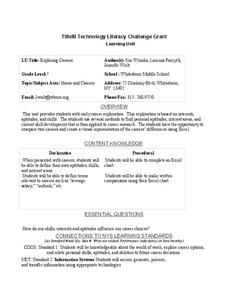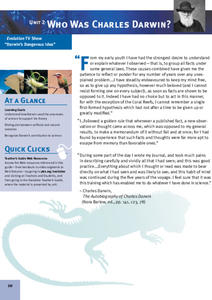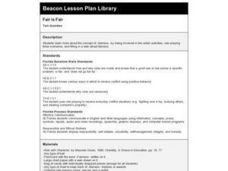Curated OER
Think Fast! What Would You Do If . . .
Fifth graders use critical thinking and problem solving skills. It allows students to make choices and to use imagination to develop a solution for each problem. Solutions are then presented to the class.
PBS
Taking a Field Trip
Students examine the importance of taking a field trip. They make predictions and practice making environmentally sound decisions. They watch a video clip about enhancing historical experiences.
Curated OER
Imaginary Trip to South Korea
Students "visit" South Korea through the use of technology, in a fun, and stimulating, detailed project. They arrange travel, make choices, work through a budget, learn history, have exposure to language, and get a sense of what a...
Curated OER
All Talk, No Action
Students act as senators to negotiate a compromise on judicial filibusters. For homework, they write letters to their senators analyzing the filibuster debate and making recommendations for the future.
Curated OER
Exploring Careers
Seventh graders investigate their career aptitudes and interests through a scavenger hunt. They display their choices in Excel spreadsheets.
Curated OER
It's all In the Package
Students examine the concept of reducing solid waste and how it relates to product packaging. They read about and evaluate the packaging decisions of two major U.S. corporations, develop a t-chart comparing the pros and cons of various...
Curated OER
Modeling Mitosis and Meiosis
Students construct and manipulate models of mitosis and meiosis and compare/contrast them. They create the models using index cards and yarn, interpret diagrams and photographs, and summarize written descriptions.
Curated OER
Castles and Fortresses of the World
Students work in groups to study castlers and fortresses of the world. They study pictures and models of well known castles and fortresses. Students construct a 3-D model of a castle or fortress using materials of their choice.
Curated OER
Mitosis And Meiosis
In this science worksheet, students answer 13 multiple-choice questions about mitosis and meiosis. For example, "Interphase is defined as..."
Curated OER
From the Mixed Up Files of Mrs. Basil E. Frankweiler
Students listen to From the Mixed-up Files of Mrs. Basil F. Frankweiler and discuss wants and needs. In this iincome and expenses instructional activity, students relate the adventures of the children in the book to a real life...
Curated OER
Who Was Charles Darwin?
Students examine how Darwin used the processes of science to support his theory. They distinguish between artificial and natural selection, recognize Darwin's contribution to science. They produce a newspaper describing the times in...
Curated OER
What is a Democracy?
Young scholars identify what makes a country democratic and compare United States and Indian political party symbols. They create their own political party and party symbol. They create a campaign speech, participate in the voting...
Curated OER
Earth Structure and Materials
Students explain what is meant by term nuclear radiation, describe in detail electromagnetic spectrum, differentiate between ionizing and non-ionizing radiation, understand half-life of isotopes, differentiate between processes of...
Curated OER
Elements 'R' Us
Sixth graders participate in a Web Quest in order to examine the periodic table of elements. After collecting information about an element of their choice, they share with group members what they have learned. Groups create class...
Curated OER
Get Ready, Get Set, Get Organized! Lesson 2 of 2
Seventh graders examine the importance of being organized when making transitions. In this organization lesson, 7th graders watch a teacher demonstration of entering a room in a disorganized manner before discussing how the transition...
Curated OER
Models as Tools for Ecosystem Management
Fifth graders explore the concept of environmental management. In this ecosystem instructional activity, 5th graders discover how models help scientists learn more about managing ecosystems. Students create their own model, make...
Curated OER
Navigating the Road to the White House
Students explore U.S. politics by researching the Presidential requirements. In this electoral process lesson plan, students identify the main requirements to become a Presidential candidate and the two main political parties. Students...
Curated OER
The Mind-Body Connection
Second graders learn about the human body. In this biology lesson plan, 2nd graders will begin with the basics of understanding charts and graphs and progress into units that cover the body systems, and mental and emotional health....
Curated OER
Poetic Math Greeting Cards
Fourth graders work in groups; collect data in a survey; depict in tables, charts, or graphs the results of the survey; and make predictions. They use creative writing skills and computer skills to generate a greeting card of their own.
Curated OER
My Brother Sam is Dead: A study of the Revolutionary War
Fifth graders complete an analysis of the Revolutionary War through literature. After "My Brother Sam Is Dead," students create a time capsule containing items that would be relevant during the Revolutionary War. They identify key...
Curated OER
Composting
Students survey what composting is. They observe the benefits of composting over the course of the school year by making your own composters and gardens. Group members compare two different compost piles, make conclusions about...
Curated OER
Reduce, Reuse, Recycle and Compost
Students expand their understanding of solid waste management. They examine the effects of packaging decisions. They study engineering advancements in packaging materials and solid waste management.
Curated OER
Thematic Maps of Your School
Students are able to list the essential elements of a thematic map, understand and use scale effectively to represent a geographic area, use research skills to develop a body of information, plan and draw an accurate thematic map based...
Curated OER
Fair is Fair
Young scholars participate in two unfair activities to explain the concept of fairness. Then they role-play different scenarios demonstrating the idea of fairness. They discuss reasons to make rules and complete a web chart on fairness.

























